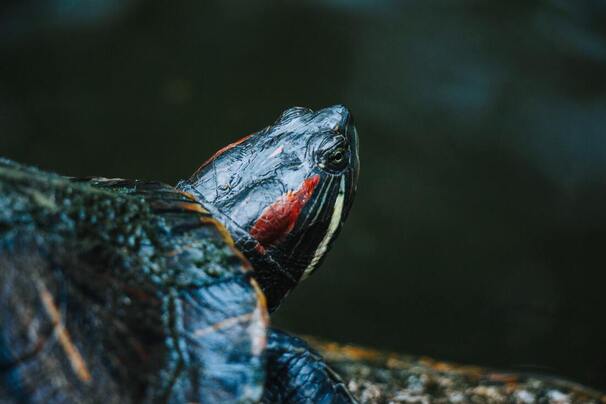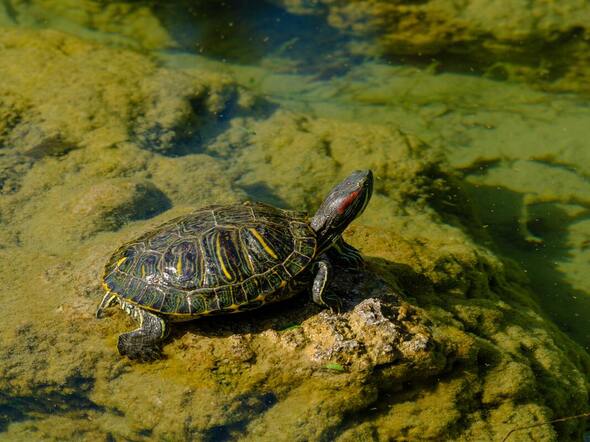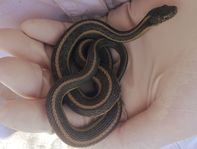Written by Alex Fulton, July 19, 2020
|
Red-eared slider turtles (RES) are extremely common in the Sacramento area and beyond. RES are not native to this area, but have been widely released primarily due to the pet trade. RES are hardy animals that do well in most bodies of water and where there is one, there are often many more. Western pond turtles (WPT) are the only turtle native to this area. RES can potentially harm WPT populations in many ways: spreading disease, competing for food - altering body condition, competing for basking sites - altering behavior, and causing stress through interspecies interactions.
|
I found a red-eared slider- what now?
LEAVE IT BE!
Why? Aren't red eared sliders invasive?
We definitely recognize that RES are not good to have in the environment. We would love to remove every single RES from the “wild” (here meaning out in the environment, not a pet), but NCHS, even combined with all the other organizations out there, do not have enough resources to do that. And anything short of dedicated removal efforts will, unfortunately, not make a substantial difference. There are pond owners that NCHS works with to place pet RES, but sadly these ponds cannot hold an infinite number of turtles and there is a finite number of safe and suitable ponds out there. The greatest good that NCHS can do at this time in the dilemma of RES is to help stop as many pet turtles from being released as possible. This stops the introduction of new disease and the introduction of RES to new areas. Only remove a RES from the wild if you are prepared to give it a home for the rest of its life.
But what if it is a lost pet?
While they are kept as pets, finding an escaped pet is extremely unlikely. Unless there is an extenuating circumstance, it is safe to assume that all found RES are “wild”. A RES’s tameness is not an indication of being a pet, many “wild” RES are very mellow.
What if the turtle is in immediate danger, such as in the middle of a road or parking lot?
If a RES is found crossing a road, you can help it get across the road in the direction it was going, if it is safe for you to do so. And then it can continue on its way. If you find one truly in a situation of danger where you do not feel comfortable leaving it, such as a shopping mall parking lot, you may move the turtle, but only the shortest distance you possibly can. Remember, moving turtles moves disease and can introduce RES to new areas. (See next bullet for more details on moving turtles.)
The red-eared slider is injured, can anyone help?
In this circumstance, it is still the best course of action to leave the turtle be and let nature take its course. Turtles are very hardy and can often withstand even severe injuries. NCHS does not rehabilitate wild found RES. If the injury is severe enough, NCHS may be able to help arrange euthanasia as a humane option.
In conclusion...
This is a really hard topic to talk about. It is important to discuss though, because many of us hold noble ideals about removing wild caught RES that clash with the actual on-the-ground practicalities and abilities we have. Anyone who loves native wildlife understandably wants to remove any RES they see, and I feel that way, too. It is not the answer anyone wants to hear to leave a non-native animal out in the environment.
Too often, people with great intentions take these RES when they find them, only to realize that there is no good solution on what to do with the turtles. And organizations such as us are left to deal with the frustrations and backtracking. (NCHS has even been contacted by people working on a RES removal project that had already removed the turtles but had no plan for what to do with them. And once someone dropped a wild caught RES off in my front yard without even telling me, I found out from my neighbors that saw it posted on the Facebook group – yikes!)
The sad truth is that when these wild turtles do get placed in homes or ponds, that takes a spot that could be needed for a pet RES. Finding good indoor or outdoor homes for turtles can be a challenge and takes a lot of vetting! For outdoor ponds, they are limited because it must be either securely fenced in with non-climbable materials or an extreme distance away from any water where dispersal is impossible.
Too often, people with great intentions take these RES when they find them, only to realize that there is no good solution on what to do with the turtles. And organizations such as us are left to deal with the frustrations and backtracking. (NCHS has even been contacted by people working on a RES removal project that had already removed the turtles but had no plan for what to do with them. And once someone dropped a wild caught RES off in my front yard without even telling me, I found out from my neighbors that saw it posted on the Facebook group – yikes!)
The sad truth is that when these wild turtles do get placed in homes or ponds, that takes a spot that could be needed for a pet RES. Finding good indoor or outdoor homes for turtles can be a challenge and takes a lot of vetting! For outdoor ponds, they are limited because it must be either securely fenced in with non-climbable materials or an extreme distance away from any water where dispersal is impossible.
How can NCHS members help?
Help pass on this information! Educate people (always with kindness and compassion) about the situation with WPT and RES in this area, as many people do not understand. Spreading disease and RES into new areas should be of utmost concern, though this isn’t usually part of the thought process when encountering RES. Encourage people to not grab RES without having a thought-out plan about how they will care for the turtle.
From the California Department of Fish and Wildlife (CDFW)
https://wildlife.ca.gov/Conservation/Invasives/Species/Redeared-Slider
“A valid sportfishing license is required to take RES, though there is no limit per person. Please do not take live RES from the environment unless you are prepared to keep it in captivity for the remainder of its lifespan. If you have a RES you can no longer care for, give it to a friend or contact your local shelter or reptile rescue organization. Please do not release or relocate RES, as it is illegal to place, or cause to be placed, any aquatic plant or animal into the waters of the state (FGC sec. 6400). Restoration projects or removal efforts should refer to the AVMA Guidelines for Euthanasia of Animals for information on humane methods of euthanasia.”








